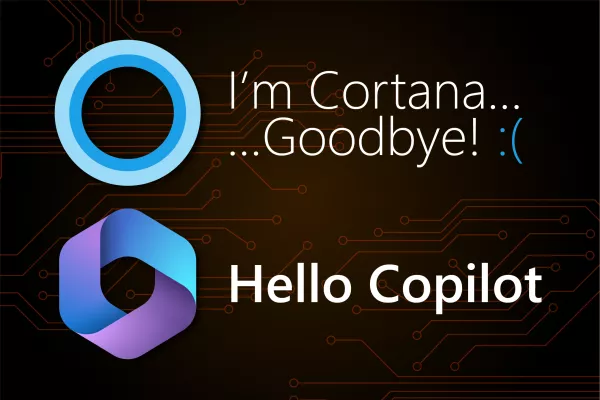The Decline of Cortana
Cortana, Microsoft's virtual assistant, was initially introduced in 2014 with the launch of Windows 10. While it gained some popularity, it struggled to compete with other established AI assistants like Apple's Siri and Amazon's Alexa. Despite continuous updates and improvements, Cortana failed to capture a significant market share, leading Microsoft to revaluate its strategy.
Reasons for Dropping Cortana:
Several factors contributed to the decision to discontinue Cortana. One of the primary reasons was the lack of widespread adoption and integration across devices and platforms. Additionally, the rise of specialised AI assistants, such as Alexa and Google Assistant, made it challenging for Cortana to stand out in a crowded market. Microsoft recognised the need for a fresh approach and set out to develop a more advanced and versatile AI assistant.
Introducing Copilot –
The Future of AI Assistance:
Copilot, Microsoft's new AI assistant, is set to redefine the way we interact with technology. Built on advanced machine learning algorithms and natural language processing capabilities, Copilot aims to provide a seamless and intuitive user experience. Here are some of the exciting features that make Copilot a game-changer.
Enhanced Contextual Understanding:
Copilot leverages deep learning techniques to understand user context better. It can comprehend complex queries, anticipate user needs, and provide more accurate and relevant responses.
Multimodal Interaction:
Copilot goes beyond voice commands and incorporates visual and gesture-based inputs. This allows users to interact with their devices in a more natural and intuitive manner, making tasks more efficient and enjoyable.
Personalised Recommendations:
Copilot utilises advanced algorithms to learn user preferences and habits, enabling it to offer personalised recommendations for various tasks, such as scheduling, reminders, and entertainment options.
Seamless Integration:
Copilot is designed to seamlessly integrate with Microsoft's ecosystem, including Windows, Office 365, and other productivity tools. This integration ensures a consistent and cohesive experience across devices, making it easier to manage tasks and access information.
Why Choose Copilot in 2023
With Copilot, Microsoft aims to address the limitations of Cortana and provide a more robust and intelligent AI assistant. Here are a few reasons why you should consider using Copilot when it is released sometime in 2023* to the masses. *Back in May of 2023, early access to 365 Copilot was given to 600 of Microsoft’s global clients… but no official release date has yet been announced.
Advanced Capabilities:
Copilot's advanced machine learning algorithms and contextual understanding enable it to deliver more accurate and personalised responses, making it a valuable tool for productivity and everyday tasks.
Natural Interaction:
Copilot's multimodal interaction capabilities make it easier to communicate and interact with your devices, reducing the learning curve and enhancing the overall user experience.
Seamless Integration:
Copilot's deep integration with Microsoft's ecosystem ensures a seamless experience across devices, allowing you to effortlessly transition between tasks and access information.
Futureproofing:
By investing in Copilot, you align yourself with Microsoft's vision for the future of AI assistance. As Copilot evolves and adapts to emerging technologies, you can expect ongoing updates and improvements that cater to your evolving needs.
Conclusion:
The demise of Cortana marks a significant shift in Microsoft's AI assistant strategy. With Copilot, Microsoft aims to provide a more advanced, versatile, and user-centric AI assistant. By leveraging cutting-edge technologies and addressing the limitations of its predecessor, Copilot is poised to become the go-to AI assistant in 2023 and beyond. As we eagerly await its release, Copilot promises to revolutionise the way we interact with technology and enhance our productivity in ways we never thought possible.







